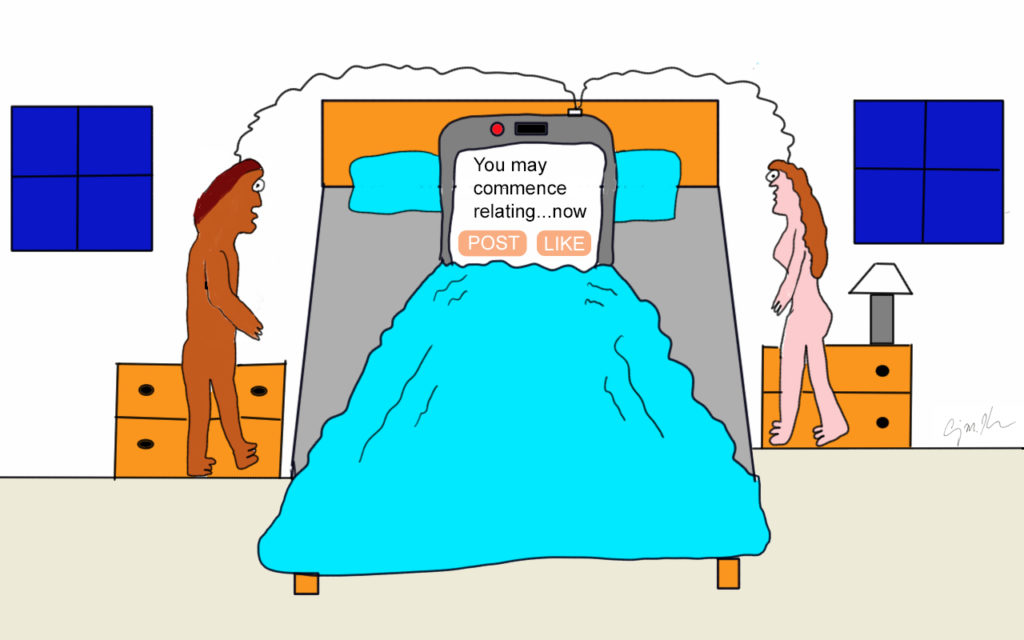This blog is a post of an editorial in the February 2018 issue of the American Journal of Bioethics. You can access the issue’s table of contents here.
I, My Love, and Apps
by Craig Klugman, Ph.D.
In this issue, Danaher, Nyholm, and Earp offer a thorough analysis of the quantified self movement as applied to relationships. Quantification is a trend toward charting, coding, and recording our everyday activities. Think of activity trackers that record your number of steps, sedentary time, even the amount of sleep you get. Now apply that same concept to your relationship and even your performance in the bedroom. Who in the relationship has given more compliments, offered more foot rubs, and completed more chores this week? Like the annual performance review at work, these new apps and devices allow us to be scored, graded, and compared based on our relationship actions.
 The arguments in favor of these apps and devices revolve around the idea that humans are fallible including in how we relate to each other. Relationship apps have “great promise when it comes to self-actualization, productivity, health, and personal well-being. This belief, in turn, stems from the assumption that we humans are selective, biased and error prone when it comes to understanding the variables that affect.” By having an objective record of our actions, we can seek to improve our relationship-related behaviors. For instance, when my spouse and I argue over who took out the garbage last or who said what during a previous conversation, we often disagree about the events that did (or did not) transpire. Without a recording of the events, the objective truth of those moments about which our interpretations differ can never be known. I may think that I give more backrubs to my partner, but he or she may disagree. Without keeping track there is no way to know the objective truth. However, with the quantified relationship, a piece of technology that has no interest in who is correct can keep track of relationship moments. That objective viewpoint is now available through technology if we choose to allow this third-party into our relationship.
The arguments in favor of these apps and devices revolve around the idea that humans are fallible including in how we relate to each other. Relationship apps have “great promise when it comes to self-actualization, productivity, health, and personal well-being. This belief, in turn, stems from the assumption that we humans are selective, biased and error prone when it comes to understanding the variables that affect.” By having an objective record of our actions, we can seek to improve our relationship-related behaviors. For instance, when my spouse and I argue over who took out the garbage last or who said what during a previous conversation, we often disagree about the events that did (or did not) transpire. Without a recording of the events, the objective truth of those moments about which our interpretations differ can never be known. I may think that I give more backrubs to my partner, but he or she may disagree. Without keeping track there is no way to know the objective truth. However, with the quantified relationship, a piece of technology that has no interest in who is correct can keep track of relationship moments. That objective viewpoint is now available through technology if we choose to allow this third-party into our relationship.
Reading this set of articles reminded me of the work of theologian-ethicist Paul Ramsey who was concerned about the potential for technology to dehumanize our family relations. In Fabricated Man (1970), Ramsey expressed concern over the new technologies of reproduction.. His criticism was that these new technologies of artificial reproduction interfered with the natural process of a loving couple coming together to create new life with god. In other words, technology changed the fundamental meaning of procreation to a means of production. Many people still feel this way but much of society has adapted to the idea that babies are conceived in petri dishes. The use of apps and devices to measure and enhance relationships feels like a similar step that removes love, romance, and mystery from two (sometimes more) people coming together romantically. Romance is reduced to a transaction. Love is defined by a series of trackable actions and scores.
At the same time that these apps change romantic love, these trackers reinforce the notion of a traditional relationship as one between two people, a man and a woman, filling heteronormative, patriarchal roles. For example, several of the articles discuss feminist perspectives that such apps reinforce the notion of women as something to be tracked and controlled by a more objective and more rational male partner. In addition, this technology reinforces a heteronormative notion of a romantic relationship. That is, some of these apps and devices assume relationships between one man and one woman as the norm. Thus, other types of partnerships—same-sex, gender fluid, trans-gender, polyamory—are relegated as not normal. For example, the website for Kindu a program to help couples try new things, has images of only male-female couples exploring rugged nature. Fix A Fight is an app to help a couple argue and uses cartoon images of only a man and woman arguing. Honeydue is an app that allows couples to manage money together and demonstrates this with thumbnail pictures of only a man and a woman. Similarly, Couple is an app for recording shared memories and uses images of only mixed-sex couples in its app store pages. A few companies do take a broader approach by including images of singles and same-sex couples or by using no anthropomorphic imagery at all.

The danger of heteronormativity is a further stigmatization of other kinds of loving, romantic relationships. If people do not recognize themselves in the images, then they may think that love is not something available to them. People in relationships that consist of same sex, gender fluid, trans-gender, or multiple partners have to explain themselves whether to others or to the app. For instance, if an app defaults to “He” and “She” language for the couple, then one person in a same-sex or trans-gender relationship has to take on the gendered identity not found in the relationship. Essentially the couple’s relationship with the app begins with a lie. Or, the couple can reach out to the developers and request a change to the program. However, these are steps that male-female couples do not need to take.
The use of such tracking technology changes the relationship: “This technology can be used to collect information that would otherwise be hidden, and to share that information between two or more people.” As has happened with fitness trackers, what begins as a fun way to record information about your performance to help you improve, often becomes an obligation to do so. I have gone on lovely hikes with friends only to hear them say at the end “My battery died and my steps weren’t logged. That didn’t count.” Such thinking puts more import on the logging than on the actual activity. The same steps were walked whether a machine counted them or not. But something about the logging makes the experience more real or more important. Might not the same happen in a relationship: “I didn’t record that we cuddled last night. Now it doesn’t mean anything.” Even before these technologies were widespread, relationships were often not real until they were “Facebook official.” That is, part of the negotiation in a relationship was when to announce to the world through social media that you were a couple, engaged, married, separated, or divorced. The Facebook relationship, like the quantified relationship, may not be the actual relationship but a representation of the relationship, or as some see, a new kind of relationship altogether.
The future of relationships will increasingly be mediated by technology whether by choice, by coercion, or by necessity. Whether one finds the arguments presented in these articles convincing, either pro or con, the reality is these programs and devices will succeed and proliferate as long as people purchase them. The stated goal may be to learn more about ourselves to improve our relationships, but their actual goal is get us to purchase them: “Self-tracking technologies are not primarily designed to change behavior; they are designed to create and sustain the desire for their use.” Thus, it is essential that we do not mistake tracking for love and that we do not lose sight of the immeasurable that makes for a good relationship.